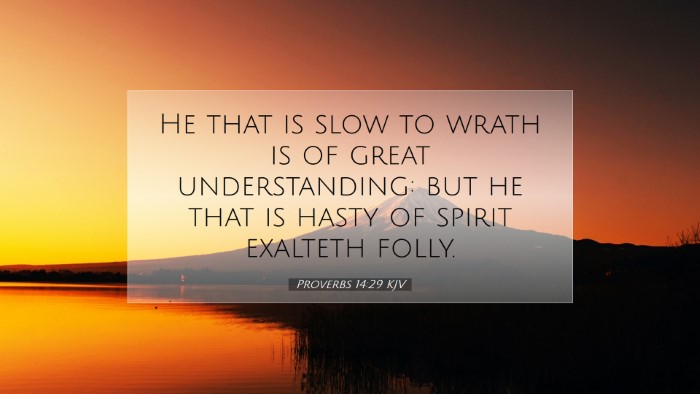Commentary on Proverbs 14:29
Proverbs 14:29 states, "He who is slow to wrath has great understanding, but he who is impulsive exalts folly."
Overview
This proverb contrasts the characteristics of a man with self-control and one who acts impulsively. The virtues of patience, wisdom, and understanding are exalted while folly and impulsiveness are condemned. This principle resonates throughout the Bible, calling believers to a greater maturity in handling their emotions.
Insights from Matthew Henry
Henry emphasizes the great understanding displayed by those who exercise patience. He notes that a man who is slow to anger demonstrates a deeper comprehension of human nature and the consequences of rash actions. Patience allows for the contemplation of circumstances and the avoidance of rash decisions that could lead to irreversible consequences.
- Understanding Requires Calmness: According to Henry, a calm demeanor fosters wisdom. The person who refrains from anger takes the time to reflect and analyze situations, which typically leads to better decision-making.
- Anger Leads to Folly: Henry warns that impulsive reactions often stem from a lack of self-control. Such attitudes glorify foolishness rather than wisdom, as they ignore the potential fallout of quick words and actions.
Insights from Albert Barnes
Barnes highlights the internal struggle individuals face regarding anger and impulsiveness. He notes that slowness to wrath signifies not only restraint but also maturity in understanding and judgment. He makes clear that those who lack impulse control suffer not only themselves but often also harm others due to their actions.
- Righteous Anger vs. Impulsiveness: Barnes categorizes anger into righteous and unrighteous. The verse implies that true wisdom finds a balance; righteous anger seeks to correct wrongs thoughtfully and justly, while impulsiveness typically results in chaos.
- Encouragement for Leaders: Leaders especially must embody this trait of patience to inspire trust and respect among those they lead. Their ability to manage their emotions greatly influences the morale and behavior of others.
Insights from Adam Clarke
Clarke focuses on the broader implications of the verse, articulating that the capacity to remain patient under provocation reflects a deep spiritual maturity. He elaborates on the concept that true understanding transcends mere emotional reaction.
- Patience as a Virtue: Clarke holds that patience is not only desirable but is integral to spiritual health. He argues that without such patience, one's understanding and discernment falter.
- Folly of Impulsiveness: Clarke points out the dangers of impulsiveness, suggesting that it often manifests from an inability to weigh consequences, leading to similar cycles of regret and folly.
Practical Applications
The teachings of this verse are highly applicable across various aspects of life; it encourages individuals, especially leaders and educators, to cultivate patience. The understanding that comes with patience can greatly enhance communication and relationships, and mitigate conflicts.
- Emotional Intelligence: Slow to wrath is an essential part of emotional intelligence—understanding one’s emotions and those of others to enhance interaction.
- Conflict Resolution: Employing patience leads to effective conflict resolution strategies, where thoughtfulness prevails over rashness.
- Spiritual Growth: The verse acts as a reminder that growth in character and spirit involves the continuous application of self-control.
Theological Reflections
The theological implications of Proverbs 14:29 extend to understanding God’s nature. God is described in Scripture as slow to anger (Exodus 34:6; Numbers 14:18); thus, this proverb invites believers to mirror divine attributes.
- Christ as an Example: Jesus Christ modeled this aspect perfectly—showing restraint amidst provocation and offering forgiveness, encouraging believers to emulate His character.
- Community Influence: A community embodying this principle fosters an environment of peace and understanding, in stark contrast to one where impulsiveness reigns.
Conclusion
In conclusion, Proverbs 14:29 serves as a powerful reminder of the importance of self-control and the value of wisdom that can arise from patience. By drawing from the depths of biblical wisdom as provided by Henry, Barnes, and Clarke, both individual believers and church leaders can find profound guidance in nurturing understanding over impulsivity, reflecting Christ's love and patience in their lives and communities.


